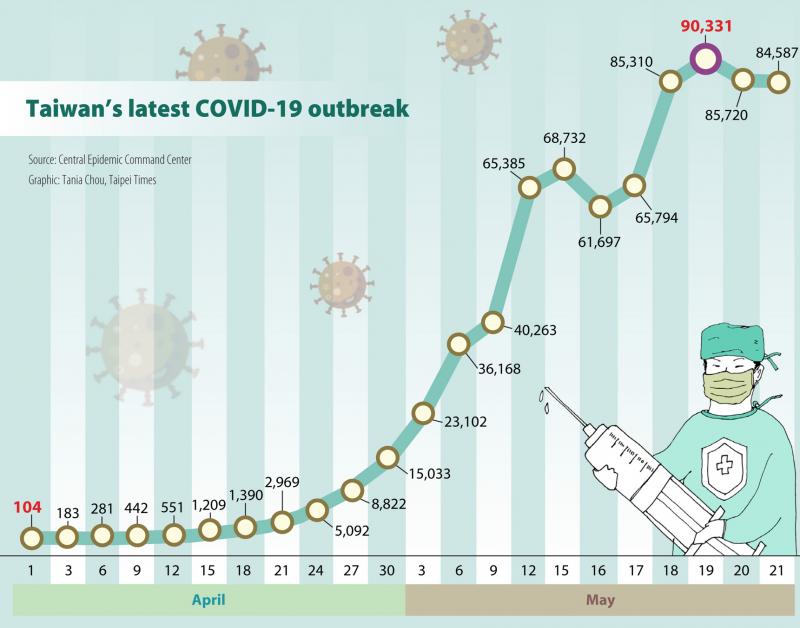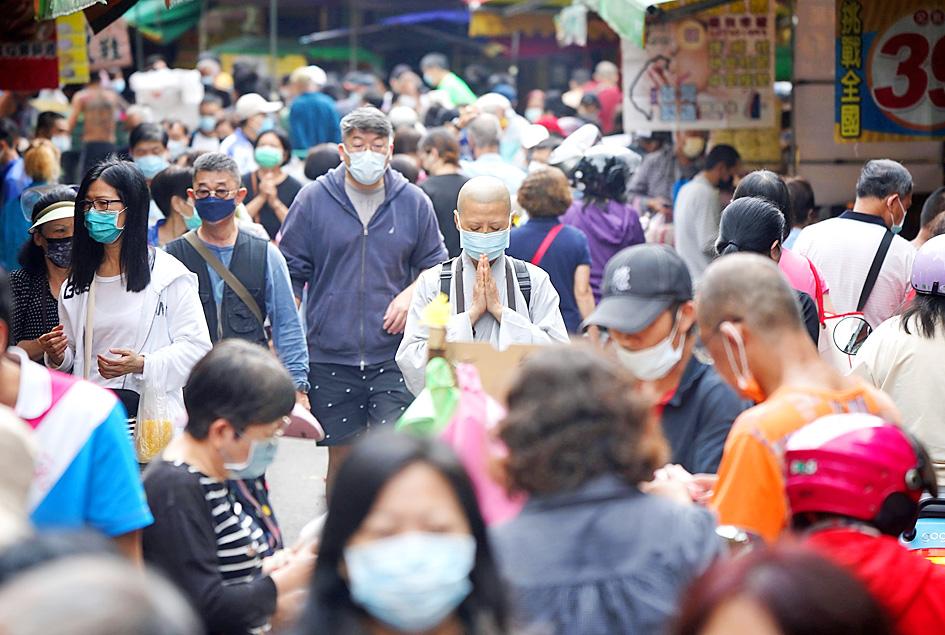People with COVID-19 who are under home care and in need of urgent medical treatment can be accompanied by another COVID-19 case to the hospital, the Central Epidemic Command Center (CECC) said yesterday, as it reported 84,587 new local cases and 59 deaths.
Most of the asymptomatic or mild COVID-19 cases reported since late last month were put under home care — recovering at home in isolation — and have been allowed to seek emergency medical treatment.
Given that other members of one household often become infected with COVID-19 when one member tests positive, the center was being asked whether an infected member could accompany a housemate to the hospital, Minister of Health and Welfare Chen Shih-chung (陳時中), who heads the center, said yesterday.

Confirmed cases who are under home care are advised to seek medical attention through telemedicine, but if they cannot book an appointment or need emergency treatment at a hospital, they can contact a local health department in advance and go to the hospital using private transport or a disease prevention vehicle.
An infected housemate is allowed to accompany a person in need of treatment to the hospital, he said, adding that they should wear a mask throughout the trip, inform the check-in counter of their positive status and avoid conversing in the hospital.
Meanwhile, Centers for Disease Control (CDC) Director-General Chou Jih-haw (周志浩), head of the CECC’s disease surveillance division, said 84,587 new local cases and 52 imported cases were reported yesterday, and 59 deaths were confirmed.

Photo: CNA
CDC Deputy Director-General Philip Lo (羅一鈞), deputy chief of the CECC’s medical response division, said 153 new moderate cases and 70 new severe cases were reported yesterday, and 12 previously moderate cases developed into severe cases.
Of the 59 deaths, 56 people had underlying health conditions, 29 were unvaccinated and 43 had not received a booster shot, he said, adding that 34 people were aged 80 or older.
There are three cases of concern among the severe cases, including a woman in her 20s who has cancer and received two doses of a vaccine; she had pneumonia and difficulty breathing for five days after infection, but has been discharged from hospital after recovering, Lo said.
Another case is a five-year-old boy who has chronic muscular disease, and was taken to an emergency room after suffering leg pain and syncope. He was found to have pneumonia, a low blood oxygen level and cerebral edema. He was intubated and transferred to a pediatric unit at another hospital.
The third case is a nine-month-old infant who does not have underlying health issues, but had a fever, severe cough and loss of vitality. He later experienced a high fever and difficulty breathing, and was taken to an emergency room, where he was put on a ventilator.
The infant has been removed from the ventilator, but remained in an intensive care unit, Lo said.

A Taiwanese software developer has created a generative artificial intelligence (AI) model to help people use AI without exposing sensitive data, project head Huang Chung-hsiao (黃崇校) said yesterday. Huang, a 55-year-old coder leading a US-based team, said that concerns over data privacy and security in popular generative AIs such as ChatGPT and DeepSeek motivated him to develop a personal AI assistant named “Mei.” One of the biggest security flaws with cloud-based algorithms is that users are required to hand over personal information to access the service, giving developers the opportunity to mine user data, he said. For this reason, many government agencies and

The National Fire Agency on Thursday said a series of drills simulating a magnitude 8.5 earthquake would be held in September to enhance the government’s emergency response capabilities. Since earthquakes cannot be predicted, only by continuously promoting disaster prevention measures could Taiwan enhance its resilience to earthquakes, agency Director-General Hsiao Huan-chang (蕭煥章) said in a news release. The exercises would be held to mark annual National Disaster Prevention Day on Sept. 21, the aim of which is to test Taiwan’s preparedness and improve its earthquake resilience in case of a major temblor, Hsiao said. As part of those drills, an earthquake alert would

DEFENSE: The National Security Bureau promised to expand communication and intelligence cooperation with global partners and enhance its strategic analytical skills China has not only increased military exercises and “gray zone” tactics against Taiwan this year, but also continues to recruit military personnel for espionage, the National Security Bureau (NSB) said yesterday in a report to the Legislative Yuan. The bureau submitted the report ahead of NSB Director-General Tsai Ming-yen’s (蔡明彥) appearance before the Foreign and National Defense Committee today. Last year, the Chinese People’s Liberation Army (PLA) conducted “Joint Sword-2024A and B” military exercises targeting Taiwan and carried out 40 combat readiness patrols, the bureau said. In addition, Chinese military aircraft entered Taiwan’s airspace 3,070 times last year, up about

STRICTER ENFORCEMENT: Taipei authorities warned against drunk cycling after a sharp rise in riding under the influence, urging greater public awareness of its illegality Taipei authorities have issued a public warning urging people not to ride bicycles after consuming alcohol, following a sharp rise in riding under the influence (DUI) cases involving bicycles. Five hundred and seven people were charged with DUI last year while riding YouBikes, personal bicycles, or other self-propelled two-wheelers — a fourfold increase from the previous year, data released by the Taipei Police Department’s Traffic Division showed. Of these, 33 cases were considered severe enough to be prosecuted under “offenses against public safety,” the data showed. Under the Road Traffic Management and Penalty Act (道路交通管理處罰條例), bicycles — including YouBikes and other